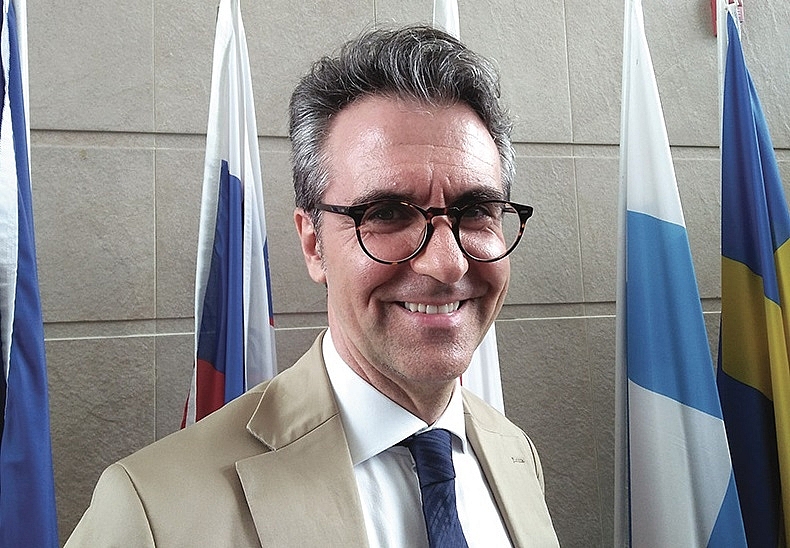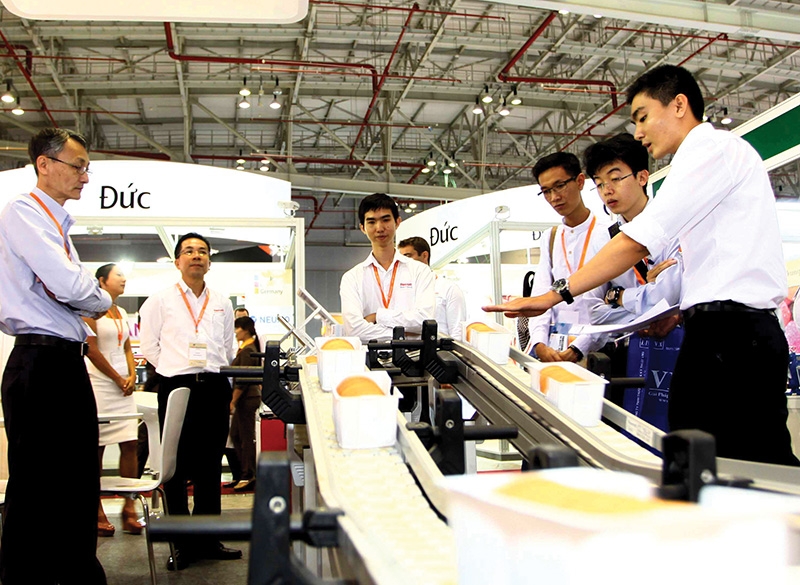Europe and Vietnam draw ties together at time of dire need
 |
| Giorgio Aliberti - Ambassador of the European Union Delegation to Vietnam |
These two agreements will undoubtedly help to deepen and strengthen the partnership between Vietnam and the EU, and serve as a platform for boosting trade and investment ties.
The EVFTA is expected to enter into force this summer. So what are the expectations on both sides? Vietnam has massive potential for EU exporters and investors to do business. It is one of the fastest-growing economies in Southeast Asia, with a vibrant market of more than 96 million consumers, an emerging middle class and a young, dynamic workforce.
The EU continues to be a very important destination for Vietnamese products, and in 2019 some 16 per cent of goods exported by Vietnam were destined to that market. With the rules-based, free-trade agreement, there will be an increase in exports both ways. For Vietnam, the trade agreement represents a step to consolidate its long process of integration into the global economy.
By promoting trade and investment links with the EU, the world’s largest trading bloc, Vietnam makes sure that openness continues to be at the centre of its development strategy to sustainably steer the country into a middle-income economy. Since day one of the entry into force of the EVFTA, businesses in both Vietnam and Europe will be immediate beneficiaries. The cut to tariffs – which can sometimes be very substantial, in the range of 25 per cent – will apply to 71 per cent to Vietnamese export to the EU and to 65 per cent of EU export to Vietnam. Gradually, practically all other tariffs will then be phased out over seven years for Vietnamese exports and 10 years for EU exported products.
 |
| Both the EVFTA and EVIPA can trigger a surge of new types of European investment never before seen in Vietnam, Photo: Le Toan |
This may sound technical for the layman. For our businessmen and women, this means a substantial reduction of their costs and will result in more money in their pockets. As we all know, any tax and tariff reduction, as a relief in coping with the economic fallout of the COVID-19 pandemic, is an important ingredient for relaunching our economies. The FTA is, therefore, an important element in nurturing the resilience of our economies. Not to forget that Vietnamese consumers will have a bigger choice and the opportunity to buy products of top quality with reasonable prices from the EU.
The dismissal of bilateral tariffs and export taxes, together with the reduction of non-tariff barriers affecting cross-border exchanges of goods and services, is expected to boost bilateral trade considerably. The export gains are estimated at €8 billion ($9.1 billion) by 2035 for EU firms, while Vietnamese exports to the EU are expected to grow by €15 billion ($17 billion). Vietnamese exports to the EU are estimated to grow by around 18 per cent according to an economic impact study from 2018. These figures fall short however to capture many of the dynamic gains that will result both for economies and societies.
With regard to services, there is significant untapped potential for greater commercial links in the future. Services activities make up the largest share of the EU economy and with the rapid urbanisation and growing middle class, the demand for services in Vietnam will only continue to rise.
It is likely and desirable that both agreements with the European Union will trigger a new wave of foreign direct investment (FDI) from the EU into Vietnam. Investments from the EU are of top quality. European companies bring high skills, best practices of organisation, and world-leading technologies to Vietnam.
European investment comes with high standards of corporate social responsibility for protecting and training workers and employees, as well as for respecting and protecting the environment. It allows Vietnam to promote economic growth and create better jobs while ensuring sustainable development. These spillover effects are essential for economies like Vietnam to avoid the middle-income trap.
Both agreements offer Vietnam a perfect platform for transforming its economy into a regional production hub. Compared with similar economies in the region, Vietnam has the first-mover advantage of 7-10 golden years of privileged access to the EU’s market. Only Singapore, which has concluded and ratified the FTA before Vietnam, is in a similarly advantageous position but its economy is mostly based on services, not on production.
With the foundations of the new economic agreements with the European Union, and taking into account the lesson from the COVID-19 crisis on the need to diversify the sources of production, Vietnam has now a golden opportunity to establish itself as a production hub. Consequently, the trade agreement will also facilitate EU-Vietnam value chain integration. Through increased FDI and expanded bilateral trade in intermediate goods and services, Vietnam will benefit from a closer economic relationship with the EU.
These positive effects and expected gains will only materialise if the promises and obligations of the agreements are swiftly put into practice. The customs officials, the regulatory authorities, and the enforcement agencies will have to be aware of these new rules and follow them in their daily contacts with importers and distributors. This may imply changes to the current ways of dealing.
It needs to be noted however that the benefits of the agreements will directly depend on the level of transparency and predictability of government behaviour in contact with business. Business people and investors are quite sensitive and may easily relocate to other places if the overall business environment is not offering stable and favourable conditions for business operations.
The COVID-19 crisis showed some vulnerabilities in the process toward uncontrolled globalisation. We all have to learn our lesson and find the most appropriate remedies. But if we believe that the future is to close ourselves behind national barriers, we would risk missing the huge opportunities that come with economic interdependence. Reducing economic interdependence would make everybody poorer.
If you take a closer look into the features of complementarity of our two economies, greater interdependence is really a win-win situation. Actually, Vietnam would reduce its vulnerability by engaging more with Europe. This is the way ahead and this is the spirit of the two trade and investment agreements just approved by the National Assembly, which indeed will lay very solid foundations on which Europe and Vietnam can further strengthen their relations.
| Key contents of the EVFTA The European Commission has described the EVFTA as the most ambitious free trade deal ever concluded with a developing country. - Near complete removal of tariff barriers: elimination of over 99 per cent of customs duties on exports in both directions; - Reduction of non-tariff barriers: Vietnam will align more closely with international standards on motor vehicles, and pharmaceuticals. As a result, EU products (which already comply with these standards) will not require additional Vietnamese testing and certification procedures. Vietnam will also simplify and standardise customs procedures; - EU access to Vietnamese public procurement: EU companies will be able to compete for Vietnamese government contracts (and vice-versa); - Improved access to Vietnamese service markets: the EVFTA will make it easier for EU companies to operate in the Vietnamese postal, banking, insurance, environmental, and other service sectors; - Investment access and protection: Vietnamese manufacturing sectors such as food, tyres, and construction materials will open up to EU investment. The deal establishes an investor-state tribunal to resolve disputes between EU investors and Vietnamese authorities (and vice-versa); and - Promoting sustainable development: the EVFTA includes commitments to implement International Labour Organization core standards (for instance, on freedom to join independent trade unions - potentially a momentous change as Vietnam does not at present have any such unions) and UN conventions (for instance, on combating climate change and protecting biodiversity). |
What the stars mean:
★ Poor ★ ★ Promising ★★★ Good ★★★★ Very good ★★★★★ Exceptional
Themes: EVFTA & EVIPA
Related Contents
Latest News
More News
- Ho Chi Minh City hits $8.37 billion in FDI (December 29, 2025 | 08:28)
- Tax sector wraps up 2025 and sets priorities for next year (December 25, 2025 | 14:00)
- Heavy industries set for pilot greenhouse gas quotas (December 25, 2025 | 10:00)
- $250 million deal targets women-owned SMEs, sustainable agriculture (December 22, 2025 | 17:40)
- UOB sees Vietnam growth easing in fourth quarter (December 22, 2025 | 17:39)
- Government moves to establish International Financial Centre (December 21, 2025 | 21:00)
- Vietnam's IFC to target global investment flows (December 21, 2025 | 18:00)
- Ha Tinh breaks ground on major Vingroup industrial and energy projects (December 19, 2025 | 18:24)
- EVN launches major power infrastructure projects nationwide (December 19, 2025 | 18:17)
- VAL inaugurates second production line to meet domestic animal feed demand (December 19, 2025 | 16:37)

 Tag:
Tag:





















 Mobile Version
Mobile Version